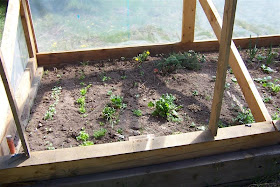
Gardening can be a very rewarding experience but can also cause you a lot of grief due to poor soils conditions, garden pests, or unpredictable weather patterns. Here is a great way to work around these problems and have a more successful garden crop for the dinner table.
Raised bed gardening is a great way to manage a small garden space in both urban and rural settings. Your efforts can be concentrated on tending your garden and not repairing the tiller. Raised beds are also open and exposed like most gardens. If you live in a region where temperatures drop drastically at night, or you are plagued by furry little pests or hopping little critters, it can leave you in a situation where your plants are vulnerable. To increase the viability of a raised bed garden, there is a simple way to fix this problem.

Cold frames have been in use for quite some time as a way to protect plants from the effects of unpredictable weather and colder temperatures. If used in combination with a raised bed, you can have the benefit of both in your gardening efforts.
Now the dimensions for making a raised bed garden with a cold frame combo will vary depending upon the space you may have available, especially since there can be a big difference between urban and more rural areas. The pictures that have been included are just an example of how you can use the two concepts together to assist you in your gardening. The approximate size of the one pictured is

The basic raised bed is simply made from beams that should be large enough to make a sturdy frame to hold your soil, allow sufficient depth for proper root growth and support the cold frame assembly that will be used as a cover. The type and size of beams is not that critical. As long as your beams provide enough room to support the edges of the cold frame cover and satisfy the other main requirements. Your individual space limitations should be the ruling factor in this regard.


The opening on the cold frame cover was divided into two sections in this example but more or less openings can be used. The only requirement is additional supports if you have more openings due to a longer raised bed. The openings of the cold frame are supported by the use of 1X4’s that have been notched when working the raised bed garden. This gives you easy access. The entire cold frame cover can be removed in one piece by one person by simply flipping it over backwards. Just do it easy so you don’t damage it. You could also get another person to help you.

The plastic sheeting was attached using old wooden tomato stakes but you can use whatever materials that are handy. Use the thickest plastic sheeting you have available to achieve the most durability.

Hinges and handles will also need to be added. You can get by without the handles but they sure make it easier to lift the covers. The hinges are pretty much a necessity.

Whether you are in a rural or an urban setting using the combination of a raised bed garden and a cold frame as a cover will help you get the most out of your garden and the space you have available. Less wasted space, less effort, and less vulnerability makes for a truly dynamic duo!
Got garden combo?
Staying above the water line!
Riverwalker

Riverwalker,
ReplyDeleteCool. I always thought I would have to use glass in a cold frame. Thanks for the insight.
A great post. Thanks
To: Someone You Know
ReplyDeleteI rank the choices for a cold frame in this order:
1.) Glass
2.) Plexiglass (hard plastic)
3.) Plastic sheeting
It really depends upon your budget or what materials are available for use.
Thanks.
RW
Google, French intensive gardening for more info on cold frames. They are incredible season extenders and can really increase your yields.
ReplyDeleteWhen I had some cold frames a few years ago, I forgot to open them one sunny February morning and it cooked the young plants inside. So ya gotta pay attention and remember to open and close them up.
Regular greenhouse plastic as a cover will last 4 years, versus common visqueen type plastic, which is usually trashed in a single season. Cheaper in the long run. You can buy it off the roll per foot in several standard widths fairly cheap.
http://www.growerssupply.com/farm/supplies/prod1;gs1_greenhouse_film_and_covering-gs1_greenhouse_films;pg108654.html
Find which width can be cut easiest to get you all the pieces you need the cheapest.
I don't recommend glass covering if you have kids - you can guess how I figured that one out!
To: Grumpyunk
ReplyDeleteThe heat levels can become intense when using a cold frame. Being able to open them in order to vent the excess heat is crucial to prevent ruining your crops.
I try to use Plexiglas when I can get some cheap(or free)but have used old patio door glass and shower door glass to make a cold frame.
Thanks.
RW